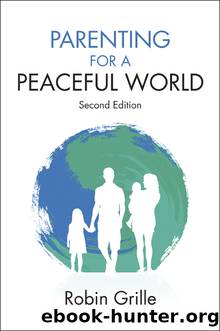Parenting for a Peaceful World by Robin Grille

Author:Robin Grille [Grille, Robin]
Language: eng
Format: epub
ISBN: 9781550925814
Publisher: New Society Publishers
22
WHAT IS EMOTIONAL INTELLIGENCE?
Emotional intelligence, a term coined by Howard Gardner in Frames of Mind,1 describes a domain of human consciousness that has, until recently, been seriously neglected. It is currently enjoying an explosion of academic attention.
There have been many efforts by psychologists and educationists to:
â¢define the concept of emotional intelligence;
â¢devise instruments for measuring it in individuals (commonly referred to as EQ); and
â¢teach its properties to both children and adults.
It has finally been acknowledged that EQ is more important than IQ when it comes to âpeople skillsââsuccess in career, in personal and business relationships, and in raising fulfillled children.
Emotional intelligence is a broad term that loosely defines a collection of skills necessary to navigate the realm of feeling and emotion. It includes a range of faculties, such as sensing the presence of emotions in your body, and the conscious ability to use language or otherwise express the emotion. It also includes the ability to contain (instead of repress) emotion, or to communicate emotion in a way that is appropriate to the relationship context, and the ability to choose when to do one or the other. It means the ability to process and let go of emotion in a healthy way, and the ability to give ourselves time to feel, and to enjoy the depths of our âselvesâ through feeling.
A maturely developed emotional intelligence includes, among a host of other things, the ability to lead wisely or follow with grace, to honor our limits as well as celebrate and fulfill our talents, and to give and receive love and support.
Last, but by no means least, emotional intelligence involves the ability to listen and sense empathically the emotions of others. Our alertness to our own constantly changing emotions informs our acuity in detecting the many different textures of emotion in others. Most healthy individuals are surprisingly skilled at inferring othersâ intentions and emotional states merely from looking at their eyes. This is a function of emotional intelligence, and has nothing to do with IQ.2
Relationships cannot be truly intimate, nor can they grow, without a deep sharing of our emotional inner worlds. Many of us have learned early in our lives to hide or ignore our feelings, and that is why relationships can become stunted and dull.
More pertinently, our ability to inspire and impart emotional intelligence to our children rests on our own mastery of the realm of feeling, and our willingness to learn and grow in this area.
In one way or another, we are all struggling to refine, develop, and expand our emotional intelligence and relationship skills. Life, with its pain and joys, could be considered a âbig schoolâ for the emotions. In many ways the development of emotional intelligence parallels the learning of a language. Just as a new language can be painstakingly learned by most adults, emotional intelligence can be cultivated through adulthood. However, learning a new language is an infinitely faster and smoother process for small children than it is for adults. When I was three years old, I
Download
This site does not store any files on its server. We only index and link to content provided by other sites. Please contact the content providers to delete copyright contents if any and email us, we'll remove relevant links or contents immediately.
Rewire Your Anxious Brain by Catherine M. Pittman(18654)
Talking to Strangers by Malcolm Gladwell(13370)
The Art of Thinking Clearly by Rolf Dobelli(10487)
Mindhunter: Inside the FBI's Elite Serial Crime Unit by John E. Douglas & Mark Olshaker(9339)
Becoming Supernatural by Dr. Joe Dispenza(8214)
Change Your Questions, Change Your Life by Marilee Adams(7780)
Nudge - Improving Decisions about Health, Wealth, and Happiness by Thaler Sunstein(7706)
The Road Less Traveled by M. Scott Peck(7601)
The Lost Art of Listening by Michael P. Nichols(7506)
Mastermind: How to Think Like Sherlock Holmes by Maria Konnikova(7342)
Enlightenment Now: The Case for Reason, Science, Humanism, and Progress by Steven Pinker(7311)
Win Bigly by Scott Adams(7194)
The Way of Zen by Alan W. Watts(6614)
Daring Greatly by Brene Brown(6512)
Big Magic: Creative Living Beyond Fear by Elizabeth Gilbert(5771)
Grit by Angela Duckworth(5614)
Ego Is the Enemy by Ryan Holiday(5445)
Men In Love by Nancy Friday(5239)
The Laws of Human Nature by Robert Greene(5208)
